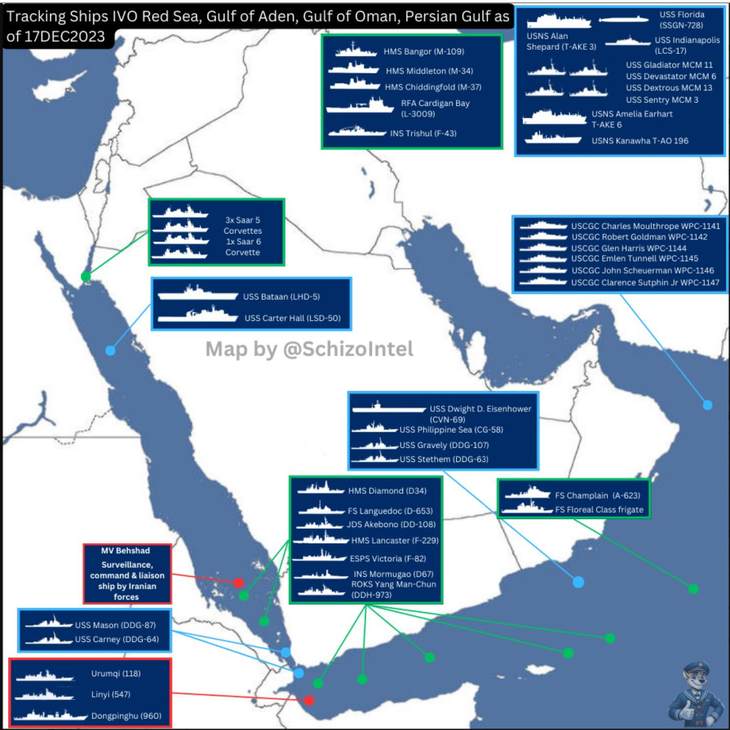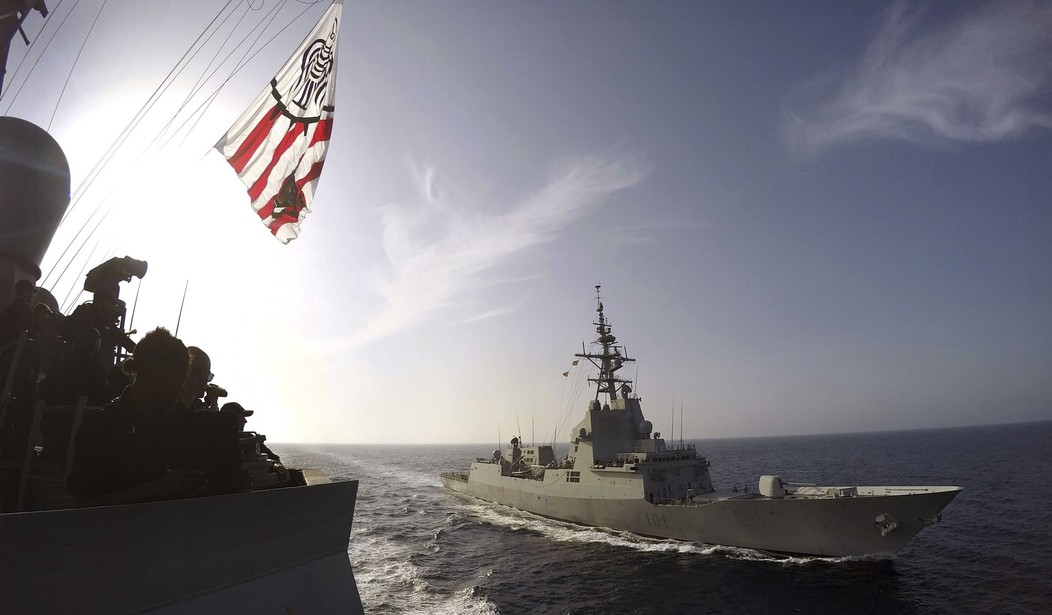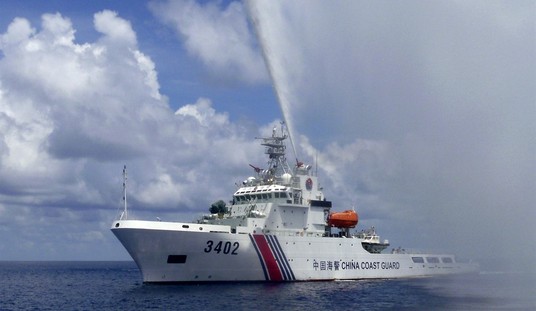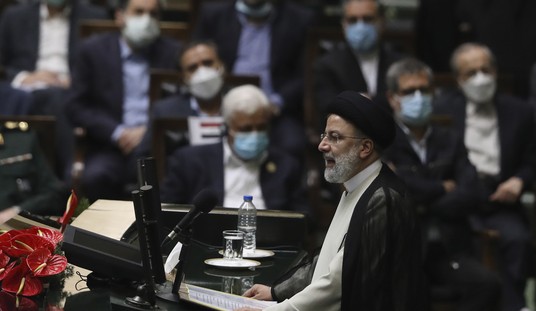It was only this past Friday when word came that two major shipping companies – Maersk and Hapag-Llloyd – were temporarily ‘pausing’ shipments through the Red Sea due to ill-mannered, Iranian-backed Houthi militias and their insatiable rocket and drone attack habits.
…This couldn’t come at a worse time.
Attacks from Houthi-controlled Yemen struck two Liberian-flagged ships in the Bab al-Mandab Strait on Friday, a U.S. defence official said, underlining the threat to vessels in shipping lanes being targeted by the Iran-aligned group.
Danish shipping company A.P. Moller-Maersk (MAERSKb.CO) said it would pause all container shipments through the Red Sea until further notice. German container line Hapag Lloyd said it was considering a similar move.
Maersk ships had already come under drone attacks last week, and that was enough for them. Even though the alternatives were pretty unpalatable as far as rerouting, crew and ship safety had to come first, and it seemed the level of risk was no longer acceptable.
…“Following the near-miss incident involving Maersk Gibraltar yesterday and yet another attack on a container vessel today, we have instructed all Maersk vessels in the area bound to pass through the Bab al-Mandab Strait to pause their journey until further notice,” Maersk said.
Bab al-Mandab is a narrow stretch of water that links the Indian Ocean to the Red Sea. Any ship using the Suez Canal as a shortcut between Asia and Europe must go through it it.
Maersk said its No. 1 priority was the safety of its crews, highlighting the challenge of balancing its customers’ needs against the duty to look after the staff. Sailing the long way around Africa would add thousands of miles to trade routes, boost fuel bills and delay cargo deliveries.
Euronav NV, an owner of oil supertankers, said it was insisting that its vessels be granted an option in all charters to avoid the Red Sea. On Thursday, Maersk Tankers said the same thing after one of its vessels was attacked.
This weekend, the crew of the USS Carney was busy earning combat action ribbons as it seemed the Houthis were really feeling their oats, and the situation got a little froggy around their boat. Things quickly escalated and the Carney turned in quite a performance.
In the early morning hours of December 16 (Sanna time) the US Arliegh Burke-class guided missile destroyer USS CARNEY (DDG 64), operating in the Red Sea, successfully engaged 14 unmanned aerial systems launched as a drone wave from Houthi-controlled areas of Yemen. The UAS were… pic.twitter.com/Rjkzng5LxW
— U.S. Central Command (@CENTCOM) December 16, 2023
While I’m sure the kids onboard the ship were charged up and spittin’ fire, the fact that the Yemeni rebels felt secure enough to launch so many drones against a single US warship gave other shipping concerns who do business through the Red Sea passage pause. Some of them had come to a decision by this morning, and the implications for global economics are far from optimum.
BP Oil just simultaneously announced they are halting all transports through the Red Sea as well.
— WM (@APTeacher1754) December 18, 2023
Evergreen announcing it would paused shipping is almost as big a hit as Maersk. In fact, if you’ll remember, it was an Evergreen freighter that ran aground and completely blocked the Suez Canal a couple of years ago.
Suez Canal blocked by stranded Evergreen boxship https://t.co/k3YBtFIHun pic.twitter.com/QxKfBcKYyT
— Splash (@Splash_247) March 24, 2021
That accident is giving us an idea of the world-wide shipping chaos this may cause, only now the alternatives are complicated by the drought situation in the Panama Canal. It’s no longer one of the default routes.
Houthis claim they’re going to prevent anything “Israeli” – be it financial interests in the vessel, the shipping line itself, or cargo – from being transported through the region. But as there’s no way to confirm whether a ship has any Israeli goods aboard other than making sure it left an Israeli port, they seem to be indiscriminately hitting whatever they can, and claiming justified actions against Jewish interests.
…The Houthi attacks appear to have escalated in the past several days with individual ships’ connections to Israel becoming less obvious. That suggests risks are widening for the industry at large, with insurance costs climbing. At least three container ships have been attacked or disrupted near Yemen in the past day or so.
Lines like Evergreen and others are either avoiding the area or Israeli ties, or both.
…Many freight firms have suspended journeys as the attacks continue.
On Monday, one of the world’s largest shipping firms said it would no longer carry Israeli cargo via the Red Sea.
In an update seen by the BBC, Evergreen Line, said: “For the safety of ships and crew, Evergreen Line has decided to temporarily stop accepting Israeli cargo with immediate effect, and has instructed its container ships to suspend navigation through the Red Sea until further notice.“
BP shutting things down starts to affect liquid natural gas and oil market prices almost immediately. They are jittery enough already with the world situation in the state it is.
Oil and gas giant BP Plc said it will pause all shipments through the Red Sea following an escalation in attacks on merchant vessels by Houthi militants.
The decision, the most tangible sign of disruption to energy flows since the attacks spiraled, comes days after all the world’s largest container shipping lines said they were temporarily halting. The step applies to all the ships that BP owns and all those it charters.
…The disruptions are a stark reminder of the inflationary and economic pressures that make securing the area a top priority. The US and its allies are working on a plan to do that, but it hasn’t been finalized yet. Avoiding the Red Sea means sailing around Africa, adding thousands of miles to voyages and delaying cargo deliveries.
There was already a slight tick up this morning.
…Analysts suggested that if other large oil firms follow suit, there may be some impact on crude prices in Europe and the Mediterranean. Brent crude, the international benchmark for oil prices, edged up to $77.17 per barrel.
Gregory Brew, an oil historian and analyst at Eurasia Group, said: “Right now it’s unclear how significant the impact will be, though if more shipping companies divert their traffic, and if the disruption lasts more than a week or two, prices are likely to climb further.”
As of yesterday, many vessels were already taking the long way home.
Another 78 container ships are delayed and awaiting further orders before transiting.
— Ryan Petersen (@typesfast) December 18, 2023
CHA-CHING CHA-CHING CHA-CHING is what you’re hearing as each one of them turns around and heads out to sea.
But things could be about to get spicy for the Houti shooties and not a minute too soon.
Wild week in the Middle East.
10 things you may have missed (from 10 accounts you should follow) 👇 pic.twitter.com/fIcDMvDefI
— Ian Ellis (@ianellisjones) December 18, 2023
There is a significant international presence working in concert with the US in the region – everyone from France and England to the Republic of Korea – and they all seem to be converging on the Yemeni trouble-makers. The Houthis are, as one watcher put it, the “irrational actors with state-level assets.”
And damned if it doesn’t look like they’re fixin’ to get a much-deserved thumpin’ of epic proportions, God – and Joe Biden’s spineless back – willing.

The question hangs in the air what action is actually taken, now that it looks like we’re also going to cloak this as multi-national co-operation, not just US muscle. Obviously the situation has become untenable – in my mind, it never should have gotten this far. Had I the keys to the White House front door, every Houthi rocket or drone launch site would have been a smoking hole in the ground 10 minutes later. Then again, I’m not a strategic genius, I only play one here at HotAir.
If a combined strike of some description against forces in Yemen happens, do we also spank the Iranian militias targeting our troops in Iraq and Syria at the same time? Send that message to Iran in addition to these proxies?
And then Iran does…what?
Say a little prayer for all our troops in harm’s way. The rubber could meet the road any time now.
In fact, it had better.
BEEGE UPDATE: I also forgot to mention in all the commercial hubbub that the sailors onboard the USS Gerald Ford just had their deployment extended for the third time because of this situation. Other ships in the various groups have already had that hammer come down on them. No Christmas for you.
US Defense Secretary Lloyd Austin has ordered the USS Gerald R. Ford aircraft carrier and one other warship to remain in the Mediterranean Sea for several more weeks to maintain a two-carrier presence near Israel as its war with Hamas grinds on, US officials said.
It would be the third time the Ford’s deployment has been extended, underscoring the continued concerns about volatility in the region during Israel’s war in Gaza. The US has two aircraft carriers in the region, a rarity in recent years.
Multiple US officials confirmed the longer deployments approved this week for the Ford and the USS Normandy cruiser on condition of anonymity because they have not yet been made public. Other ships in the Ford’s strike group had already had their deployments extended.
Sure, there’s all this unsettled business going on, but there are also shortages of personnel to replace any of these people, and a skimpy looking pipeline as far as new blood.
If you don’t think for one moment this isn’t going to impact retention further, I’ve got a bridge in Manhattan covered with protesting Hamas supporters to sell you. Should this continue to drag out or look really dicey, I’ll be interested to see if they start putting stop losses on separations to keep enough trained uniformed bodies in the ranks.








Join the conversation as a VIP Member